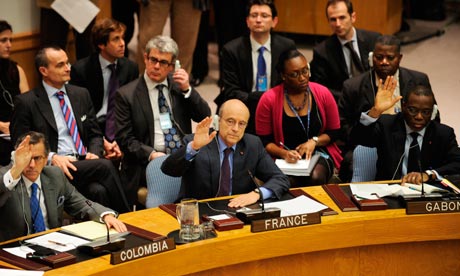By Eric C. Sigmund
Impunity Watch Reporter, Middle East
TRIPOLI, Libya – Government forces continue to advance on rebel strongholds in Libya Friday despite declaring an immediate ceasefire to hostilities with civilian opposition. Libyan Foreign Minister Mussa Kussa declared that “Libya has decided an immediate ceasefire and an immediate halt to military operations.” The announcement came shortly after the passage of a UN Security Council resolution calling for the end to the government’s violent suppression of civilians and threatening military enforcement if the resolution’s conditions are not met. Rebel forces however, say that Colonel Gaddafi is “bluffing” and report facing bombing raids and attacks from Libyan troops in a number of cities.

Security Council Resolution 1973, passed on Thursday, condemns the suppression of Libyan citizens by the Gaddafi regime and authorizes the international community to use “all necessary measures” to protect civilian populations in Libya. In particular, the resolution authorizes the international community to establish no-fly zones and initiate an arms embargo. The creation of no-fly zones over Libyan airspace would require the destruction of Libyan air defense systems. While the resolution states that international forces will not be deployed on the ground, it notes that Libyan military forces may be legitimate targets of international enforcement efforts if they fail to halt operations against civilians. In conjunction with Res. 1973, the UN also ratcheted up economic sanctions against the government and froze Libyan assets.
The Resolution also condemns the government’s deployment of mercenaries to subdue civilian resistance. The regime has actively recruited mercenaries from surrounding countries and tribal regions. Advertisements for pro-Qaddafi fighters have been launched in a number of countries including Kenya and Ginuea. Reports indicate that mercenaries are offered up to $2500 per day to fight for the Libyan government. Manpavan Joth Kaur, commentator for S. Rajaratnam School of International Studies (RSIS), expresses that mercenaries are particularly “dangerous and brutal because they are monetarily-motivated and lack personal or cultural ties with the local people. Their earnings are guaranteed on unconditional loyalty to their recruiters.”
The International Criminal Court has warned that the government’s indiscriminate attacks against civilian populations constitute “war crimes.” The United Nations estimates that over 1000 people have been killed and an additional 300,000 have fled Libya since clashes began a month ago. A coordinated international humanitarian aid effort has been organized to assist those displaced by the crisis.
To read the full text of Resolution 1973 click here.
To watch President Obama’s remarks about Res. 1973 click here.
For more information please see:
Sydney Morning Herald – Rebels say Libyan Govt Ceasefire a Bluff – Mar. 19, 2011
ABC News – How Would a No-Fly Zone Work Over Libya? – Mar. 18, 2011
Bloomberg – Libya’s Qaddafi Under Threat from Allied Military Forces – Mar. 18, 2011
RSIS Commentaries – “Mercenaries” in Libya: Impact of Legal Impunity – Mar. 17, 2011
UPI – Gadhafi’s Mercenaries Trigger Terror Alarm – Mar. 17 2011